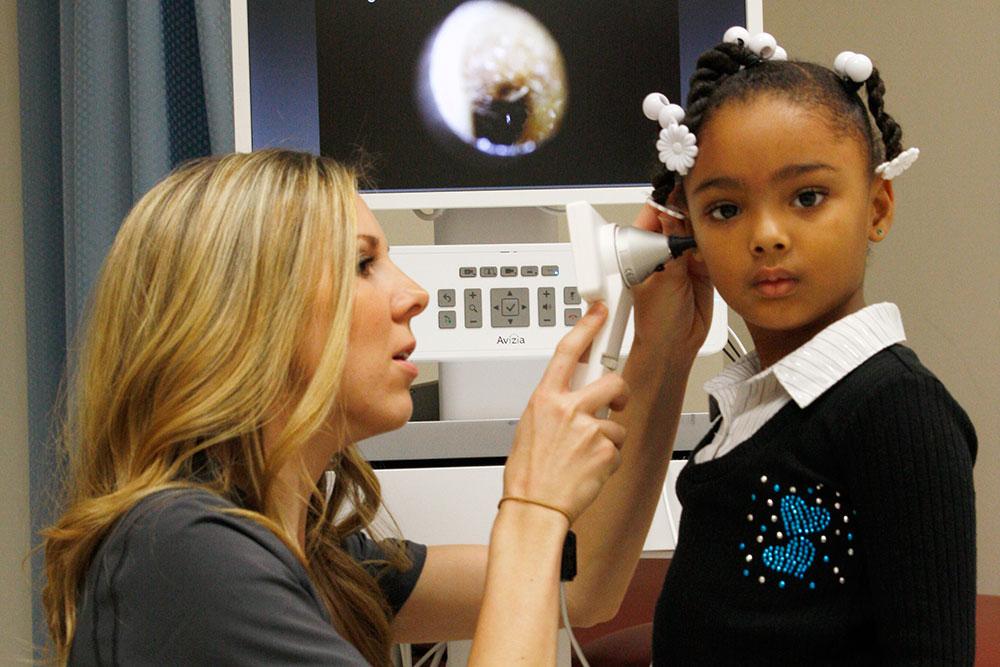
Health Services
Find information about injuries and illness at school, requirements for giving medicine at school, health screenings, and access health resources.

Health services and school nurses
We empower children and parents with the knowledge necessary to promote wellness and maintain healthy lifestyles so that students are prepared for a successful academic and life experience.
On this page
Student Health Updates
Make sure we have the latest health information for your child by completing the form below. You can use the form to make updates throughout the year as needed.
Injuries and illnesses at school
Every campus has a full-time registered nurse (RN) on-site. The school clinics are equipped to provide basic first aid only. All health services staff are CPR/AED certified and have received emergency preparedness training.
If your child is seriously injured or seriously ill, we will immediately notify you or your authorized emergency contacts.
Products used in the clinic
Certain over-the-counter products are stocked in the clinic for treatment:
- aloe vera gel
- calamine lotion
- Camphophenique
- petroleum jelly
- Mentholatum
- saline eye wash
Please inform the school nurse if you do not want your child to be treated with these products.
Bacterial Meningitis
Expand AllWhat is Meningitis?
Meningitis is an inflammation of the covering of the brain and spinal cord. It can be caused by viruses, parasites, fungi, and bacteria. Viral meningitis is most common and the least serious. Meningitis caused by bacteria is the most likely form of the disease to cause serious, long-term complications. It is an uncommon disease but requires urgent treatment with antibiotics to prevent permanent damage or death.
Bacterial meningitis can be caused by multiple organisms. Two common types are Streptococcus pneumoniae, with over 80 serogroups that can cause illness, and Neisseria meningitidis, with 5 serogroups that most commonly cause meningitis.
What are the symptoms?
Someone with bacterial meningitis will become very ill. The illness may develop over one or two days, but it can also rapidly progress in a matter of hours. Not everyone with meningitis will have the same symptoms.
Children (over 1 year old) and adults with meningitis may have a severe headache, high temperature, vomiting, sensitivity to bright lights, neck stiffness, and drowsiness or confusion. In both children and adults, there may be a rash of tiny, red-purple spots. These can occur anywhere on the body.
The diagnosis of bacterial meningitis is based on a combination of symptoms and laboratory results.
How serious is Bacterial Meningitis?
If it is diagnosed early and treated promptly, most people make a complete recovery. If left untreated or treatment is delayed, bacterial meningitis can be fatal, or a person may be left with a permanent disability.
How is Bacterial Meningitis Spread?
Fortunately, none of the bacteria that cause meningitis are as contagious as diseases like the common cold or the flu, and they are not spread by simply breathing the air where a person with meningitis has been. The germs live naturally in the back of our noses and throats, but they do not live for long outside the body. They are spread when people exchange saliva (such as by kissing; sharing drinking containers, utensils, or cigarettes) or when people cough or sneeze without covering their mouth and nose.
The bacteria do not cause meningitis in most people. Instead, most people become carriers of the bacteria for days, weeks or even months. The bacteria rarely overcome the body's immune system and cause meningitis or another serious illness.
How can Bacterial Meningitis Be Prevented?
Vaccination
Bacterial meningitis caused by Streptococcus pneumoniae and Neisseria meningitidis may be prevented through vaccination. The vaccine which protects against Streptococcus pneumoniae is called pneumococcal conjugate vaccine or PCV. This vaccine is recommended by the Advisory Council on Immunization Practices (ACIP) for children in the first year of life. Neisseria meningitidis is prevented through two types of vaccines. The first is a meningococcal conjugate vaccine which protects against 4 serogroups A, C, W, and Y and is referred to as MCV4. The second is a vaccine against Neisseria meningitidis serogroup B and is referred to as MenB.
The ACIP recommends MCV4 for children at age 11-12 years, with a booster dose at 16-18 years. In Texas, one dose of MCV4 given at or after age 11 years is required for children in 7th-12th grades. One dose of MCV4 received in the previous five years is required in Texas for those under the age of 22 years and enrolling in college. Teens and young adults (16-23 years of age) may be vaccinated with MenB. This vaccine is not required for school or college enrollment in Texas.
Vaccines to protect against bacterial meningitis are safe and effective. Common side effects include redness and pain at the injection site lasting up to two days. Immunity develops about 1-2 weeks after the vaccines are given and lasts for 5 years to life depending on the vaccine.
Healthy habits
Do not share food, drinks, utensils, toothbrushes, or cigarettes. Wash your hands. Limit the number of persons you kiss. Cover your mouth and nose when you sneeze or cough. Maintaining healthy habits, like getting plenty of rest and not having close contact with people who are sick, also helps.
Who is at Risk for Bacterial Meningitis?
Certain groups are at increased risk for bacterial meningitis caused by Neisseria meningitidis. These risk factors include HIV infection, travel to places where meningococcal disease is common (such as certain countries in Africa and in Saudi Arabia), and college students living in a dormitory. Other risk factors include having a previous viral infection, living in a crowded household, or having an underlying chronic illness.
Children ages 11-15 years have the second highest rate of death from bacterial meningitis caused by Neisseria meningitidis. And children ages 16-23 years also have the second highest rates of disease caused by Neisseria meningitidis.
If you or a friend might have bacterial meningitis seek prompt medical attention. Your school nurse, family doctor, and the staff at your local or regional health department office are excellent sources for information on all infectious diseases. You may call your family doctor or local health department office to ask about meningococcal vaccine. Additional information may also be found at the web sites for the Centers for Disease Control and Prevention (CDC) and the Texas Department of State Health Services (DSHS).
Managing health conditions
Does your child have a chronic health problem? Are you looking for information and forms related to allergies, asthma, diabetes, and other special needs? See our managing health conditions page.
Don't forget to update us about any changes in your child's health conditions. You can make updates throughout the year as needed.
Medicine at school
Only medication that cannot be given outside of the school day will be administered at school (i.e. mealtimes, physician designated time, four times a day or greater.) All medication taken at school must be prescribed by a doctor or dentist licensed to practice in the State of Texas. School nurses must also have a signed parent request.
Label requirements
All medication must be in the original container and properly labeled with:
-
student’s name
-
name of medication
-
dosage and times to be taken.
Giving medication to school/nurse
All medications must be deposited with the school nurse or in the school office. It is recommended that only a 30 day supply be brought to school.
It is strongly suggested that a parent deliver the medication to the clinic and remain to count the medication amount with school personnel.
Unused medication
Unused medication may be returned home with a student with written parent permission.
Over-the-counter medications
Over-the-counter medications like advil and cough drops will not be administered at school unless there is:
-
A signed doctor’s order giving specific instructions for medication administration
-
A signed parent request
Students carrying their own medicine
Students may carry and self-administer emergency rescue medication while at school or school functions with permission from parents, physician, and school nurse.
Health screenings
Expand AllVision and hearing
This screening is mandated by Texas law in grades:
- Early Childhood (EC)
- Prekindergarten (PK)
- Kindergarten (KN)
- First (01)
- Third (03)
- Fifth (05)
- Seventh (07)
- for students in other grades who are new to GISD
Parents of students who fail two vision screenings will receive a referral letter from the school nurse recommending a more comprehensive exam by an eye doctor. Parents of students who fail the hearing screening will receive a letter from one of the school district’s audiologists recommending either additional testing at the sound booth at the GISD Administration Building (free of charge) or a more comprehensive exam by a physician.
Spinal
The Department of Health Services will administer Spinal Screening as mandated by the State of Texas Statutes.
Spinal screening is designed to detect abnormalities that may be indicative of conditions such as scoliosis, kyphosis, or lordosis. This is done in a private environment by school nurses.
Parents of students who have any positive findings will receive a letter from the school nurse with recommendations.
Acanthosis Nigricans
Acanthosis Nigricans (AN) is a skin discoloration that may indicate high levels of insulin in the blood which results from insulin resistance. Insulin resistance can create a potential risk for the development of Type 2 Diabetes. The skin on the nape of the neck will be visually examined.
This screening is mandated by Texas law in grades:
- First (01)
- Third (03)
- Fifth (05)
- Seventh (07)
The screening is usually done at the same time as the vision and hearing screening. If the AN marker is noted, then the student will have blood pressure, height, and weight measured individually and privately at a later date. Parents will be notified of these specific findings.

Get vaccinated at our Student Services Clinic
Our Student Services Clinic provides vaccines for Garland ISD students. The clinic offers:
- A variety of no-cost vaccines for students that qualify (appointment required)
Visit the Student Services Clinic page or contact the Student Services Clinic (972-494-8538) for more information.















